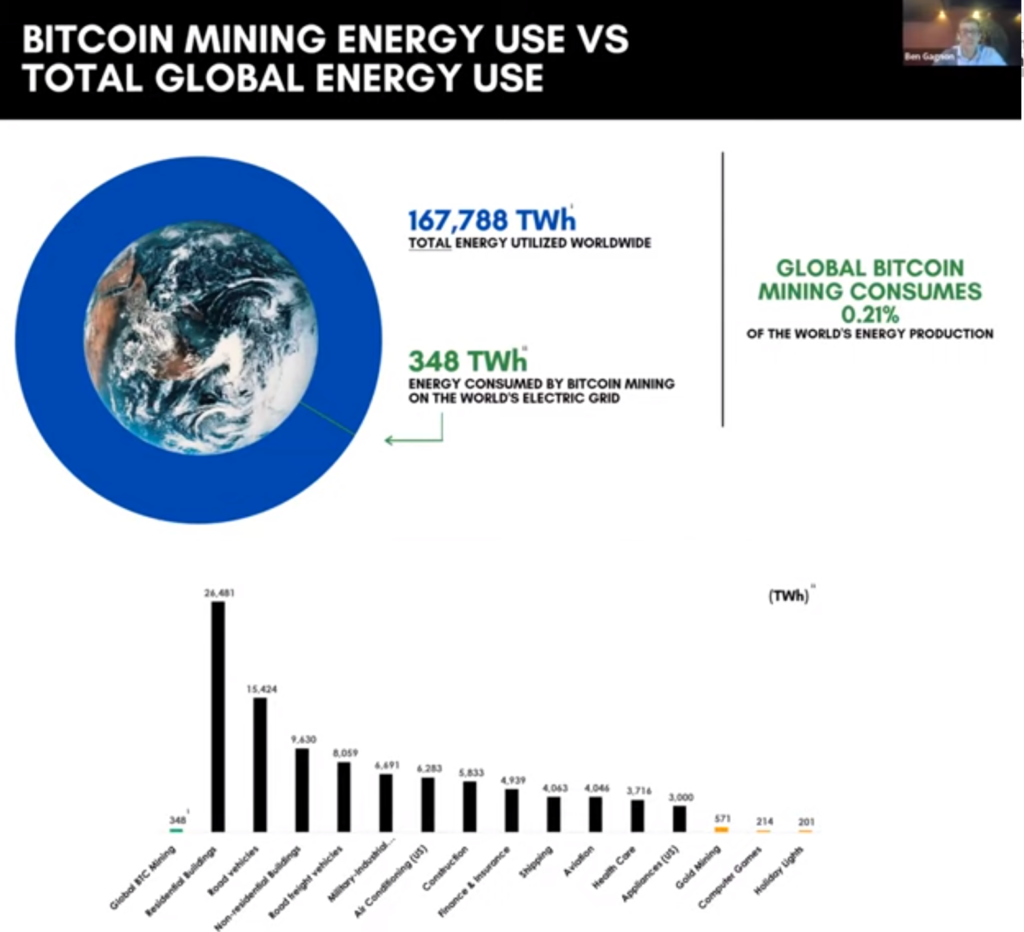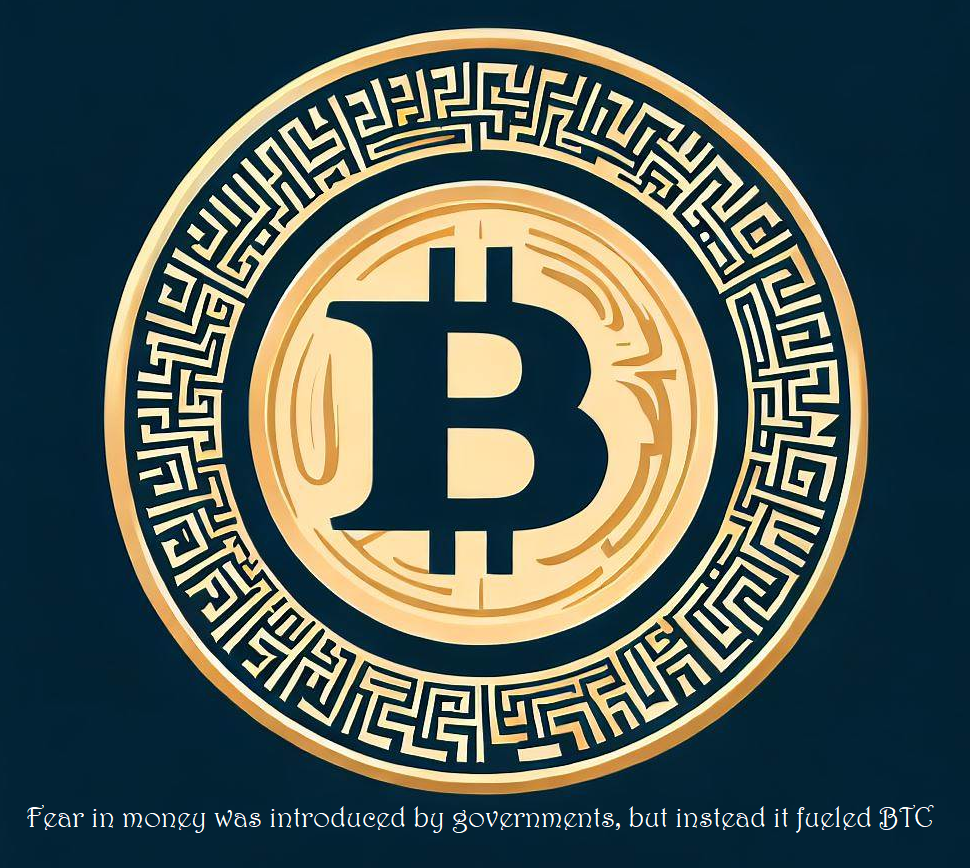
An interesting talk about Bitcoin mining – check it here.

While Bitcoin’s energy consumption has been a subject of concern, its potential to positively impact energy grids and ESG principles cannot be overlooked. Achieving these benefits requires a collaborative effort between the mining industry, energy providers, regulators, and environmental organizations to promote sustainable practices and prioritize the use of renewable energy sources.
A few points about Bitcoin mining
Energy Arbitrage: Bitcoin mining can play a role in optimizing energy consumption by using excess or wasted energy that would otherwise go unused. This is especially relevant in the case of intermittent renewable energy sources like wind and solar power. Miners can set up operations near these sources and utilize surplus energy during periods of high production, effectively reducing energy wastage.
Grid Stability: Bitcoin mining operations, when located strategically, can act as a stabilizing factor for the energy grid. They can adjust their energy usage in response to grid conditions, either by reducing mining activity during peak demand or increasing it when there’s an excess of energy. This helps to balance the grid and reduce the risk of blackouts.
Economic Growth in Remote Areas: Bitcoin mining can stimulate economic activity in remote and underdeveloped regions. Miners often establish operations in areas with abundant renewable energy resources. This economic growth can lead to improved infrastructure, education, and healthcare services in these regions, benefiting local communities.
Job Creation: Bitcoin mining operations require a workforce for maintenance, security, and management. As the industry grows, it generates job opportunities, particularly in regions that have struggled with economic challenges. This job creation can have a positive social impact by reducing unemployment rates and improving local economies.
Promoting Innovation: The demand for energy-efficient mining solutions in the Bitcoin industry has spurred innovation in energy-saving technologies and hardware. These innovations can have broader applications beyond Bitcoin mining, contributing to more energy-efficient practices in other industries. Just look at how immersion and hydro mining are capturing waste heat.
Reducing Flaring and Waste: In some regions, natural gas is flared or wasted during oil extraction due to lack of infrastructure for transport or utilization. Bitcoin mining operations can convert this otherwise wasted natural gas into electricity, reducing environmental harm and harnessing a previously untapped energy source.
Global Accessibility: Bitcoin operates on a global scale and can provide access to financial services for individuals and communities in all regions. Setup a mining rig and start contributing to BTC.
ESG-friendly aspects of Bitcoin
Financial Inclusion: Bitcoin has the potential to foster financial inclusion by providing access to financial services for individuals who are unbanked or underbanked. This aligns with the social aspect of ESG by reducing disparities in financial access and empowering marginalized communities.
Reduction of Middlemen: Bitcoin’s peer-to-peer nature reduces the need for intermediaries in financial transactions. This not only lowers transaction costs but also reduces the risk of corruption and fraud, promoting transparency and governance within financial systems. This safeguards consumers, promotes trust, and aligns with the social aspect of ESG by protecting consumers from fraudulent products.
Reducing the Carbon Footprint: Some mining operations are located in regions with abundant clean energy, and the industry is increasingly focusing on utilizing renewable sources to power mining operations.
Bitcoin can be used to monitor and report on carbon emissions and climate impact in real-time. This transparency supports environmental ESG goals by encouraging organizations to reduce their carbon footprint and adopt greener practices.
Democratized Investment: Through the tokenization of assets, Bitcoin and layer 2 technology allow for fractional ownership of assets like real estate, making investments more accessible to a wider range of investors. This aligns with the social aspect of ESG by democratizing access to investment opportunities.
Responsible Supply Chain Management: Bitcoin Layer 2 technology can be used to track and verify the origins of products, promoting ethical and sustainable supply chain practices. This transparency contributes to the governance aspect of ESG by reducing the likelihood of human rights abuses and environmental harm in supply chains.
Reduced Paper Waste: By facilitating digital transactions and digital contracts, Bitcoin reduces the need for paper-based financial processes. This aligns with the environmental aspect of ESG by reducing paper waste and lowering the environmental impact of financial operations.
Community Empowerment: Bitcoin mining operations often engage with local communities, providing jobs and economic opportunities. This social engagement can lead to community development projects and empowerment, contributing to the social aspect of ESG.
Open Innovation: Bitcoin layer 1 and layer 2 are open-source technologies, fostering collaboration and innovation among developers and organizations. This openness encourages the development of ESG-related solutions and technologies that can benefit society and the environment.
Update on spot BTC ETFs in US
Blockrock
Bitwise
VanEck
Fidelity
21Shares and Ark Invest
Invesco & Galaxy
Wisdomtree
Valkyrie
Franklin Templeton – Filing date 09/12/23
Grayscale (Filing to convert: GBTC to Spot BTC ETF)

Read the older article about BTC ETFs here.
New mining rigs arriving in March 2024 are significantly improving efficiency.
S21 (200 Th/s, 3550 W, efficiency 17.8 J/TH) and S21 Hyd (335 Th/s, 5360 W, efficiency 16 J/TH ).
Ultra-low radiation cables reduce background noise for neutrino and dark matter detectors.

Quotes
Young people can die, old people must die. This regime have to die. Fight ageing, start biohacking.
Consider Earth as a spaceship rotating and revolving in space. Exercise caution when contemplating any attempts to alter its course or position.